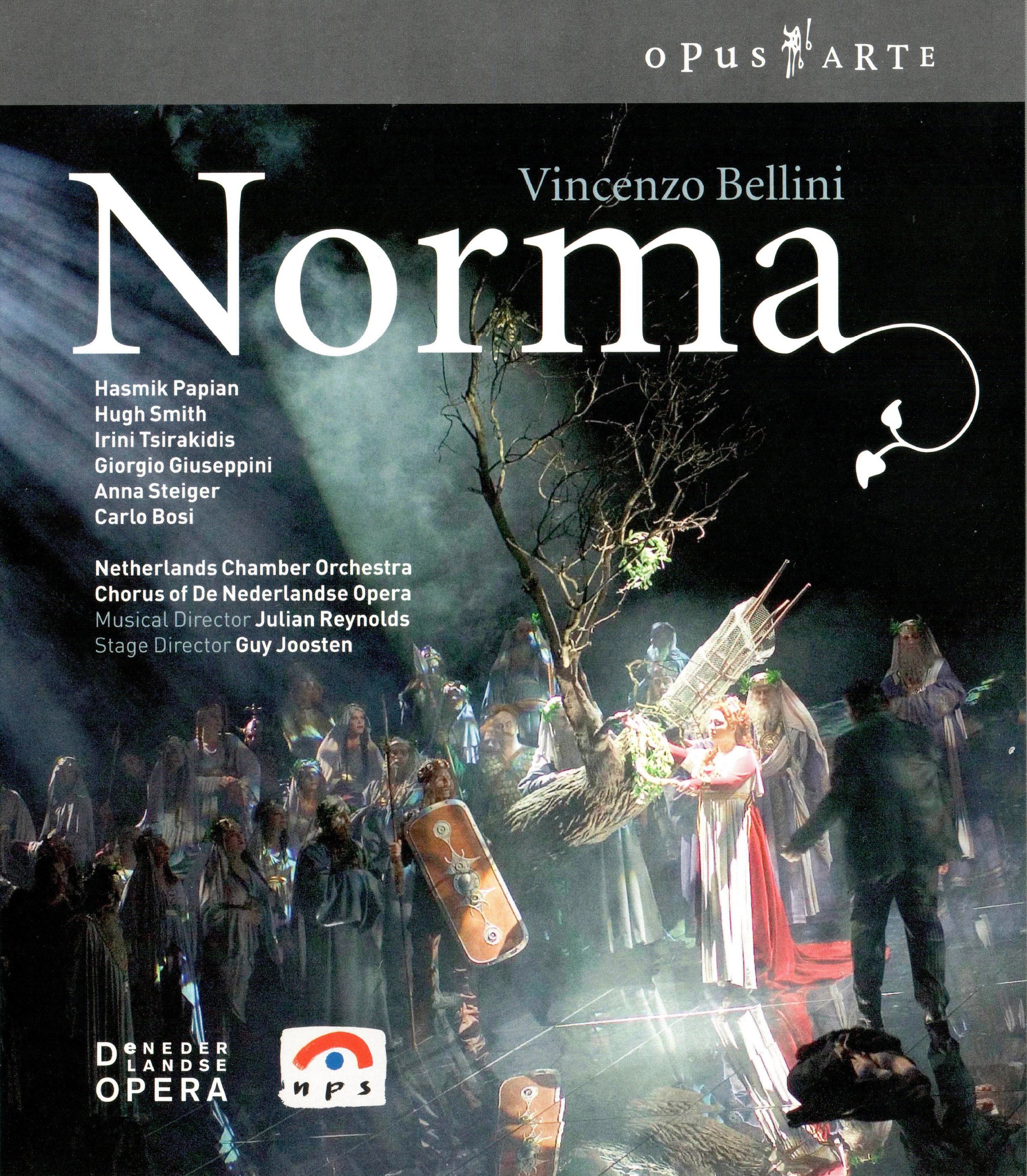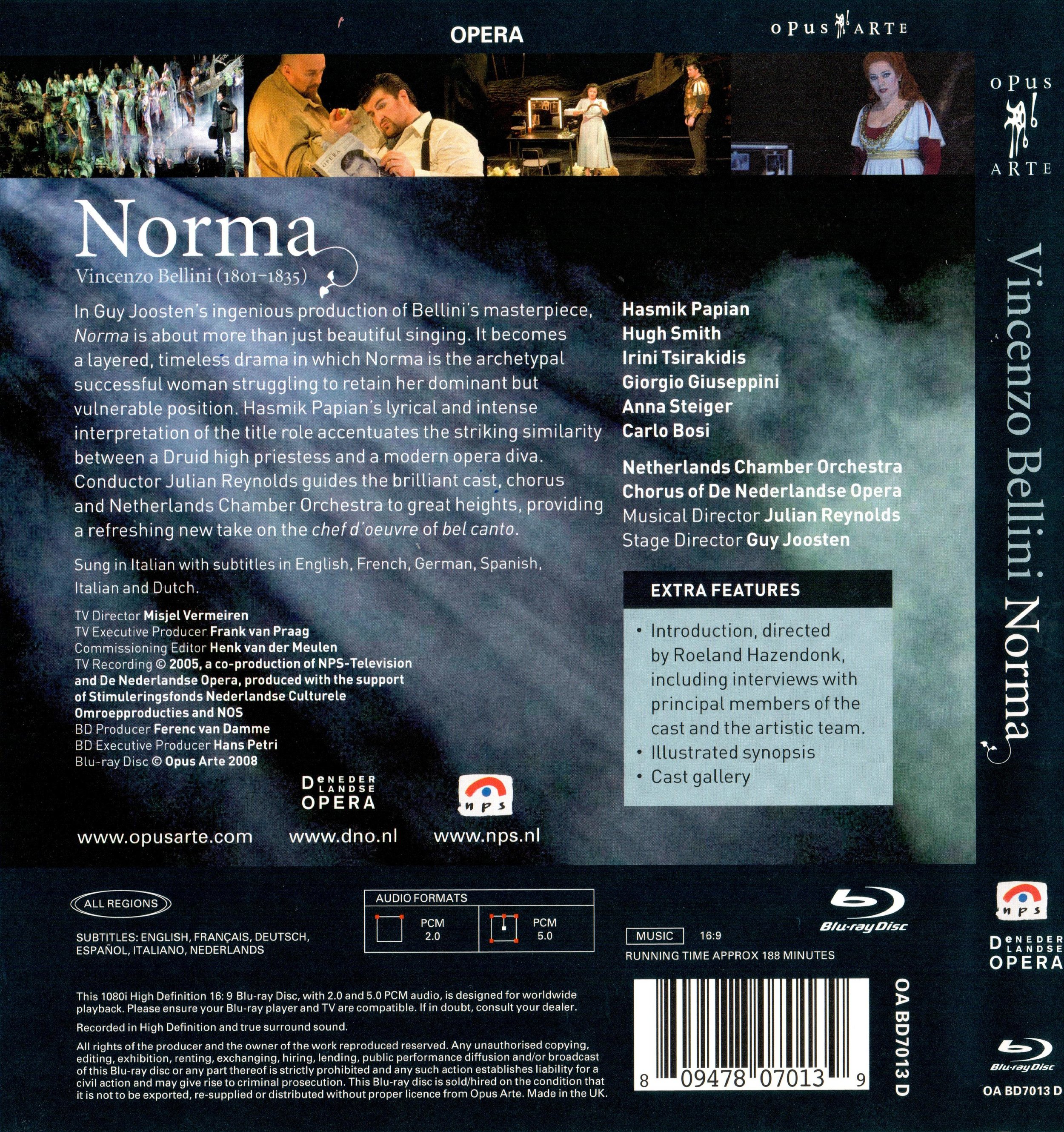

Vincenzo Bellini Norma opera to libretto by Felice Romani. Directed 2005 by Guy Joosten at De Nederlandse Opera. Stars Hasmik Papian (Norma), Hugh Smith (Pollioni), Giorgio Giuseppini (Oroveso), Irini Tsirakidis (Adalgisa), Anna Steiger (Clotilda), and Carlo Bosi (Friend of Pollioni). Julian Reynolds conducts the Netherlands Chamber Orchestra and the Chorus of De Nederlandse Opera (Chorus Master Matthew Halls). Set design by Johannes Leiacker; costumes by Jorge Jara; lighting by Davy Cunningham; dramaturgy by Luc Joosten. Directed for TV by Misjel Vermeiren. Sung in Italian. Released 2008, disc has 5.0 PCM sound. Grade: B-
Here's a comment from Wonk Gordon Smith in 2010:
“A great HD channel we have in Europe called BravaHDTV recently showed this "notoriously quirky" Opus Arte version of Norma. I thought I would watch for just a minute, but I kind of got caught up in it. The trouble with Norma for me is that I always find its Priestess and Druids and Centurions a bit hard to swallow. Plus there are a lot of set pieces that are almost invariably "stand and deliver" numbers. It's hard to get any stage "business" going to add visual interest. I think the "parallel" story in this subject version—of events backstage at the opera house—works rather well. I liked the way the Diva arrives, signing autographs, just before singing "Casta Diva". And I enjoyed the ambiguity of not being sure whether the singers are acting out their own backstage romance or actually performing the opera. (Isn't this something we're getting used to with peeks behind the scenes in the Met live transmissions and on HDVD extras?) As the show progresses, it gradually moves more into a performance and away from the "backstage" view. And the singing is rather good overall. So I find the Opus Arte Joosten/Reynolds take more entertaining than the famous version with Caballé at Orange with its bad PQ and performance that appears to be taking place in a Force 9 gale. The other Norma I know is the much acclaimed version with June Anderson. It also suffers from being woefully static and unimaginatively staged. And I didn't like the wooden Centurion whose arm is stuck out in the air most of the time! So let's not be too hard on Joosten for his audacious direction. He succeeded in making the opera more interesting even though he knew this could invoke the wrath of traditional Bellini lovers.”
We are using the B- verdict on this got from Gordon's L'OpeaDou jury.
In Norma everyone is pure or will be purified and is therefore worthy of the beautiful singing line bestowed on him by Bellini. It's usually Republican Romans in regalia and rebels wearing rugs. Enter the spear-point folks at De Nederlandse Opera with their controversial update: they don't mess with the music (I think), but they do stuff two parallel stories into the time allotted. This Doppelgänger mode leads to all manner of quirkiness. For example, in the end, Norma and Pollioni leave for a cruse in first class rather than mount a funeral pyre for self-immolation. You also see some truly silly costumes.
This production provides evidence that opera singers are disproportionately victims of the obesity epidemic in the Western world. I was particularly disturbed to see Norma's two young sons (mute roles) played by boys so fat that they had trouble climbing out of a trap door. Is this child abuse? Well, maybe not, but it sure interferes with my enjoyment of beautiful song.
Oh! yes, back to the music. Despite all the distractions, the orchestration and the singing on this disc will satisfy you that they are right to call this "bel canto." If you are a newcomer to opera, we suggest you first try the Bellini I Puritani HDVD published by Deutsche Grammophon (Anna Netrebko at the Met) and then view this Norma. If you are an experienced Bellini lover, you will enjoy this Norma if you have a taste for adventure.
OR
